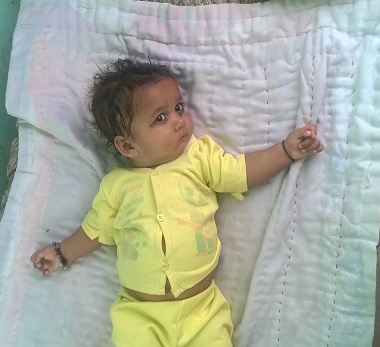HEALTH

Intervention helped a severely malnourished 3-month boy to bounce back to good health
Located in one of India’s harshest conditions geographically and climatically, ancient beliefs against immunisation in Barmer are a common existence. In was in January 2015, that the story of a three-month-old boy, Kamlesh from Barmer District’s remote village Mannaniyo ki Dhani in Baitu Block, came to light. Kamlesh’s parents had been avoiding his immunization ever since his birth.
This was discovered during a routine monitoring visit for polio vaccination, conducted by CARE India in association with Accredited Social Health Activist (ASHA).
ASHA’s local member Meera and CARE India’s project officer, both visited Kamlesh’s house and found the 3-month old boy severely malnourished. Conversation with parents revealed that their traditional and cultural beliefs against immunisation were the reason behind Kamlesh’s state.
With consistent visits, the activists tried to gradually sensitise the parents on the criticality of child immunization and its effect on their son’s health. Kamlesh’s father soon got on board, started taking him for his immunisation shots and paying extra attention towards his son’s overall health.
With gradual progress, ASHA further strengthened their follow ups with Kamlesh’s parents through a variety of IEC (Information Education and Communication) material, especially designed to suit the cultural context in Barmer along with effective counselling techniques targeted towards especially changing his mother’s beliefs around child health. Kamlesh’s mother started breast feeding that further helped him recover physically.
After nine months of continuous care and nutrition, Kamlesh completed all of his scheduled vaccinations in September 2015 and was an ideal weight of 8kgs for children his age.
ASHA still continues to follow up regularly with the family with counselling for Infant Young Child Nutrition (IYCN) and growth monitoring protocols.
Growth Monitoring Chart of Kamlesh
RACHNA
The initiative was a part of CARE India’s RACHNA project (Reproductive and Child Health Nutrition Awareness). The project aims to contribute to significant reductions in maternal and infant mortality, to improve menstrual hygiene and reproductive health of adolescent girls and women in Barmer distric
|
|




